

Global Consciousness Project. Scientific American Mind Volume 25, Issue 6. Friends of Max Skousen. The Quantum Psychology Project® Albert Einstein Metaphysics: Simplifying the Metaphysical foundations of Albert Einstein's Theory of Relativity. Introduction Hi everyone.
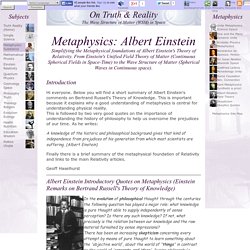
Below you will find a short summary of Albert Einstein's comments on Bertrand Russell's Theory of Knowledge. This is important because it explains why a good understanding of metaphysics is central for understanding physical reality. This is followed by two very good quotes on the importance of understanding the history of philosophy to help us overcome the prejudices of our time. As he writes: A knowledge of the historic and philosophical background gives that kind of independence from prejudices of his generation from which most scientists are suffering. Finally there is a brief summary of the metaphysical foundation of Relativity and links to the main Relativity articles. Geoff Haselhurst Albert Einstein Introductory Quotes on Metaphysics (Einstein Remarks on Bertrand Russell's Theory of Knowledge) 'We all start from naive realism, i.e., the doctrine that things are what they seem.
Metaphysical Foundations of Albert Einstein's Theory of Relativity. Information about JoM-EMIT. Journal of Memetics - Evolutionary Models of Information Back to JoM-EMIT Home The Journal of memetics is a peer-reviewed academic journal.
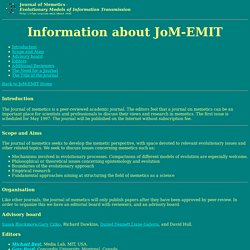
The editors feel that a journal on memetics can be an important place for scientists and professionals to discuss their views and research in memetics. The first issue is scheduled for May 1997. The journal will be published on the Internet without subscription fee. Scope and Aims The journal of memetics seeks to develop the memetic perspective, with space devoted to relevant evolutionary issues and other related topics. Online papers on consciousness. Virtual reality made me believe I was someone else. I am no longer Aaron Souppouris.
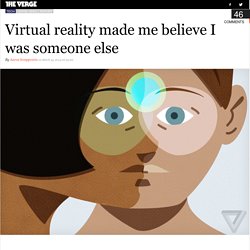
I am a woman. Science & Nature - Human Body and Mind - Mind - Personality. Take a personality test. Conflict Resolution Skills: Turning Conflicts into Opportunities. Understanding conflict in relationships Conflict arises from differences, both large and small.
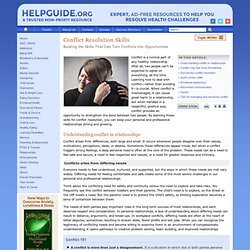
It occurs whenever people disagree over their values, motivations, perceptions, ideas, or desires. Sometimes these differences appear trivial, but when a conflict triggers strong feelings, a deep personal need is often at the core of the problem. These needs can be a need to feel safe and secure, a need to feel respected and valued, or a need for greater closeness and intimacy. Conflicts arise from differing needs Everyone needs to feel understood, nurtured, and supported, but the ways in which these needs are met vary widely. The Revolution Is Love! Our Movement is for the 100% Research explains why you can’t remember being a baby. Scientists have found the first evidence of a physical mechanism that may stop us from remembering our early childhood.
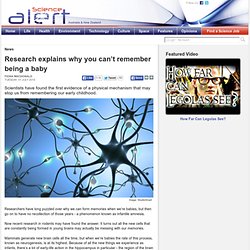
Researchers have long puzzled over why we can form memories when we’re babies, but then go on to have no recollection of those years - a phenomenon known as infantile amnesia. Now recent research in rodents may have found the answer. It turns out all the new cells that are constantly being formed in young brains may actually be messing with our memories. Mammals generate new brain cells all the time, but when we’re babies the rate of this process, known as neurogenesis, is at its highest. Because of all the new things we experience as infants, there’s a lot of early-life action in the hippocampus in particular - the region of the brain that is associated with memories and learning. Usually this type of hippocampus activity is associated with improved memory, as Susannah Locke writes for Vox. The team investigated the process by first creating memories in various rodents.
Vygotskian Approach - Tools of the Mind. Lev Vygotsky Dr.
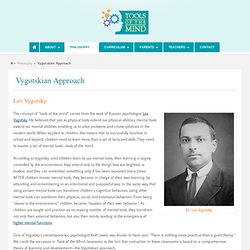
Lev Vygotsky The concept of “tools of the mind” comes from the work of Russian psychologist Lev Vygotsky. He believed that just as physical tools extend our physical abilities, mental tools extend our mental abilities, enabling us to solve problems and create solutions in the modern world. When applied to children, this means that to successfully function in school and beyond, children need to learn more than a set of facts and skills. According to Vygotsky, until children learn to use mental tools, their learning is largely controlled by the environment; they attend only to the things that are brightest or loudest, and they can remember something only if has been repeated many times. Two typesof knowledge, understanding, awareness and knowing. There are two aspects or two types of knowledge, understanding, awareness and knowing.
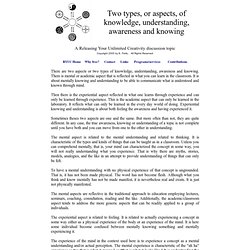
There is mental or academic aspect that is reflected in what you can learn in the classroom. It is about mentally knowing and understanding to be able to communicate what is understood and known through mind. Then there is the experiential aspect reflected in what one learns through experience and can only be learned through experience. This is the academic aspect that can only be learned in the laboratory. Www.iacad.org/istj/33/2/understanding.pdf. Unit 1 - Understanding vs. Knowing - KNILT. Overview Online learning presents a unique set of benefits and challenges, compared to the traditional classroom.
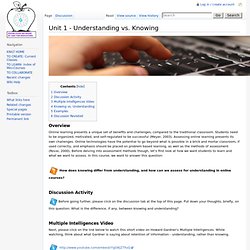
Students need to be organized, motivated, and self-regulated to be successful (Meyer, 2003). Assessing online learning presents its own challenges. Online technologies have the potential to go beyond what is possible in a brick and mortar classroom, if used correctly, and emphasis should be placed on problem based learning, as well as the methods of assessment (Rovai, 2000). Question Everything: Understanding. Knowing vs.
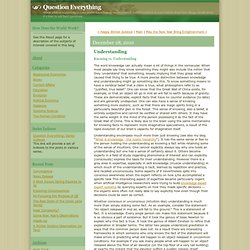
Understanding The word knowledge can actually mean a lot of things in the vernacular. When most people say they know something they might also include the notion that they ‘understand’ that something, loosely implying that they grasp what caused that thing to be true. A more precise distinction between knowledge and understanding might go something like this. To know something means to have a veridical belief that a claim is true, what philosophers refer to as “justified, true belief.”